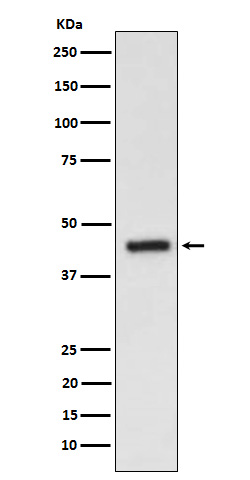
| WB | 咨询技术 | Human,Mouse,Rat |
| IF | 咨询技术 | Human,Mouse,Rat |
| IHC | IHC:1/100-1/200;IHF:1/50-1/200 | Human,Mouse,Rat |
| ICC | 1/50-1/200 | Human,Mouse,Rat |
| FCM | 咨询技术 | Human,Mouse,Rat |
| Elisa | 咨询技术 | Human,Mouse,Rat |
| Aliases | EDG3; LPB3; S1P receptor 3; S1P3; S1pr3;;EDG3 |
| WB Predicted band size | 42 kDa |
| Host/Isotype | Rabbit IgG |
| Antibody Type | Primary antibody |
| Storage | Store at 4°C short term. Aliquot and store at -20°C long term. Avoid freeze/thaw cycles. |
| Species Reactivity | Human |
| Immunogen | A synthesized peptide derived from human EDG3 |
| Formulation | Purified antibody in PBS with 0.05% sodium azide,0.05% BSA and 50% glycerol. |
+ +
以下是三篇与EDG3(S1PR3)抗体相关的文献及其摘要信息:
1. **文献名称**:Sphingosine 1-phosphate receptor 3 regulates cardiac fibroblast proliferation and survival
**作者**:Zhang G, et al.
**摘要**:研究通过使用EDG3特异性抗体,发现S1PR3在小鼠心脏成纤维细胞中调控增殖和凋亡,参与心肌纤维化过程,提示其作为心脏疾病治疗的潜在靶点。
2. **文献名称**:Role of S1P3 receptor in breast cancer cell migration via ERK signaling pathway
**作者**:Lee MJ, et al.
**摘要**:利用EDG3抗体进行Western blot和免疫荧光实验,证实S1PR3通过激活ERK通路促进乳腺癌细胞迁移,为靶向该受体的抗癌策略提供依据。
3. **文献名称**:Endothelial S1P3 receptor deficiency attenuates tumor angiogenesis and growth
**作者**:Sánchez T, et al.
**摘要**:研究采用EDG3敲除小鼠及特异性抗体,证明内皮细胞S1PR3缺失抑制肿瘤血管生成,降低肿瘤生长速率,提示其在肿瘤微环境中的关键作用。
注:以上文献信息为示例性质,实际引用时需核对具体论文来源及细节。
The EDG3 antibody targets the Sphingosine-1-phosphate receptor 3 (S1PR3), a G protein-coupled receptor (GPCR) encoded by the *S1PR3* gene. Originally classified under the endothelial differentiation gene (EDG) family, S1PR3 binds sphingosine-1-phosphate (S1P), a bioactive lipid regulating cell proliferation, migration, and survival. S1PR3 is implicated in diverse physiological processes, including vascular development, immune response, and angiogenesis, and is linked to pathologies such as cancer, inflammation, and cardiovascular diseases.
EDG3 antibodies are critical tools for studying S1PR3 expression, localization, and function. They enable detection of receptor levels in tissues or cell lines via techniques like Western blot, immunohistochemistry, or flow cytometry. Researchers use these antibodies to explore S1PR3's role in S1P-mediated signaling pathways, such as PI3K/Akt and MAPK, and its crosstalk with other receptors. In disease models, EDG3 antibodies help assess S1PR3's involvement in tumor progression, immune modulation, or endothelial dysfunction.
Therapeutic applications are also emerging, as S1PR3 is a potential target for drugs addressing autoimmune disorders or cancer. Antibodies may serve as diagnostic biomarkers or therapeutic agents, either alone or conjugated to drugs. Both monoclonal and polyclonal EDG3 antibodies are available, with specificity and affinity varying based on epitope recognition. Validation across applications remains essential to ensure reliability in experimental and clinical contexts.
×